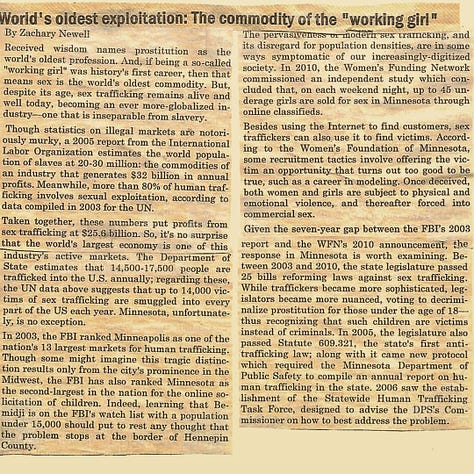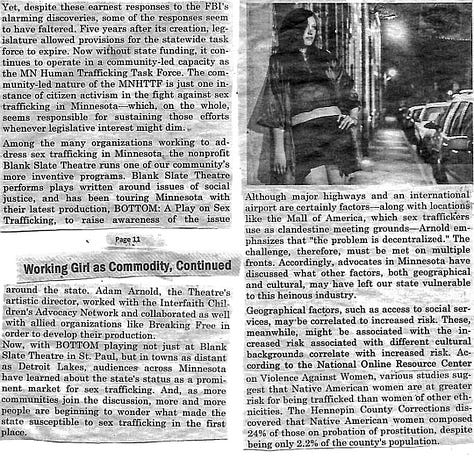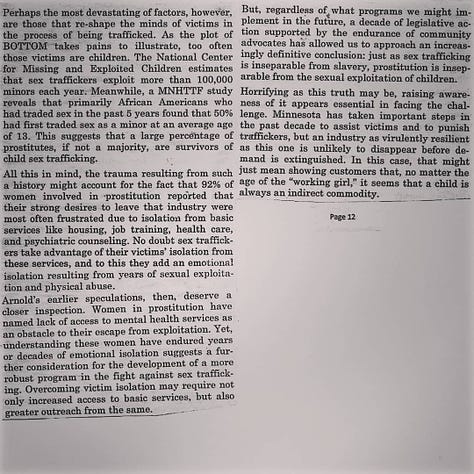The Hot & Fresh Pizza-Man: Year One
Reviewing our right-on-time crimefighter's first year in action
Happy anniversary, beloved customers! Now, technically I’m two days early, if you check the date on my first dispatch, but I just couldn’t wait: not if I wanted to keep up my biweekly-on-Sundays release schedule, anyway—the demands of which inspire me, in fact, to tell you all now that I’m taking a month off, and without that pair of slices, I’m afraid you’ll just have to go hungry.
But I won’t leave you with nothing: I plan to fool around a little in the chat for Radio Free Pizza on Substack’s app. In the meantime, however, please enjoy morsels like the AI-generated theme song available with added branding in the video just below.
Now, believe it or not, our last “slice” of Radio Free Pizza was the final one from our third “pie,” in the terminology developed here for a batch of eight dispatches. (Not counting the 2023 retrospective or the 2024 forecast, themselves each divided in eight narrow slices.) That’s 24 total dispatches to scrutinize! Lucky for us, I’d say: I’m always hunting for new material, and taking a look at what I’ve done so far sometimes helps me get me a better idea of where to go from here.
Think it will work again this time? Let’s find out!
Charting the Territory
Year One started with the big reveal: I’m Zach.1 Pleasure to make your acquaintance once more! I’m a longtime comic-book nerd who also enjoys writing about superheroes.2 I script and my friend Dave illustrates a comic, Local Interest Pulp, starring (a parody of) one of our neighborhood eccentrics3 writing a novel series which I publish4 as the “interim founder” of Diaphora Co., an independent arts-and-entertainment collective.5
With those introductions out of the way, Year One moved into a discussion of cancel culture as a modern phenomenon, using the comic-book community as an example.6 That led, naturally, to a discussion of contemporary American politics more generally,7 and the impossibility of dividing it from economics.8 This exploration continued into the sphere of political linguistics as I examined liberal9 and conservative10 ideological dialects, with those dispatches introducing the concept of cultural austerity before I applied it to the 2023 Hollywood strikes and detailed how my speculations on an ownership model for Diaphora Co., incorporating the DAO structure from the cryptocurrency sector, could address such issues.11
From there, Year One turned again toward economics to explore its intersections with both historical and contemporary geopolitics.12 But I didn’t last too long before I started talking about superheroes again.13 (That dispatch deserves special mention as the only one to include footnotes, for the purposes of aggregating improvised plot notes for the Pizza-Man saga.) With that out of my system, I redoubled the earlier investigation into the geopolitics of economics under the ascendancy of the BRICS+ trading bloc,14 before deploying again the technique of comparison to history to examine present-day neo-Nazis in the U.S., Canada, and Ukraine.15 Cultural austerity appeared again as I discussed further its relationship to social engineering,16 before examples from that dispatch led me to showcase Panama as a victim of Western imperialism in Latin America, both in history and in the present day.17 Our attention then turned to the World Economic Forum (WEF) for what it can tell us about imperialism’s present-day agenda as I meanwhile discussed strengths and weaknesses in indie-media discourse surrounding the organization.18
When the more conventional calendar had only just turned, Year One was still charging ahead. In fact, I started moving closer to home, discussing the 2020 George Floyd riots in Minneapolis and the subsequent fall of the city.19 (You can see how Patrizio handled it in Local Interest Pulp #3.) Soon enough I started talking about superheroes again: in particular, these stories’ current shortcomings in staging our world with any poetic fidelity.20 Questioning how superhero narratives have served as U.S. imperial propaganda led me to examine thereafter the function of popular entertainment as predictive programming in the context of the coronavirus pandemic.21
Noting from that example how the response to that international crisis enriched the ruling class, I turned to capitalist proposals for addressing climate change and contrasted these against socialist models for domestic energy policy.22 Comparing energy policies under capitalism and socialism preceded what I believe to have been the sole instance throughout Year One when a critique of socialism appeared, courtesy of Friedrich Nietzsche.23 But you wouldn’t know it from the third pie’s last slice, which articulated Libertarian Communism as a socialism with American characteristics designed for the 21st century.24

(“…Alright, cool! Anything else?”)
Eulogy for Better Futures
During this past Year One, I recorded and released the twelfth and final episode of the Better Futures podcast miniseries, on which I’ve been in intermittent production since 2021. In each episode I interview one guest to find out what critical issues they see facing humanity today, and to explore innovative solutions for a more promising future. These issues span a diverse range, including climate change, social media, public health, social contracts, community action, and the flaws in our social systems and institutions, which we advocate addressing variously through cooperative solidarity or critical resistance or revolutionary change.
Our first episode begins with an exploration of existentialist perspectives on building a better future, emphasizing the importance of questioning social norms and fostering connections with life’s meaning. Subsequent episodes delve into climate change, economic disparities, and threats to the food supply, while exploring the potential for innovation and positive change. Discussions on public health and preventative measures follow, exploring ways to incentivize corporations and governments to invest in human well-being.
In a unique episode recorded in 2021, Aron interviewed me about my motives for producing Better Futures, how they relate to my recovery from a coma in 2018, and about the need for positive interactions and healthier public discourse more generally. Other episodes focus on themes of empathy, compassion, vulnerability, and the social contract between citizens and government. Yet more explore: the impact of local community action and mutual aid; the flaws in fiat currencies and the Federal Reserve system compared to alternatives like gold, silver, and decentralized cryptocurrencies; and how partisan politics, censorship, and media consolidation sow social division, emphasizing the importance of returning journalism to a trade that serves the working class and holds the powerful accountable.
Guests and I repeatedly examined social media’s impact on society, highlighting the challenges of navigating an uncontrollable entity filled with conflicting visions and manipulative information. We also discussed the influence of technology companies on political discourse and the need for regulating Big Tech, emphasizing the importance of protecting free speech and counteracting the privatization of public spaces. (This concern for a lack of regulation on Big Tech would later reappear in Radio Free Pizza’s coverage of Dr. Robert Epstein in January.)
All together, the series examines our society’s failures from a grassroots level, and seeks to chart ways through which we can work together to create a better world for ourselves and the rest of our species. These twelve interviews offer a thought-provoking journey aiming to address various societal challenges, encouraging critical thinking and inspiring listeners to take a proactive approach in building a more promising future.
(“…Sounds awesome! What’s next then?”)
Minneapolis Lies Prone
Our coverage of the local and national reception of the AlphaNews documentary The Fall of Minneapolis (2023) reported the scandalized reaction of Glenn Loury and John McWhorter on The Glenn Show, sponsored by the Manhattan Institute. In February, however, the estimable gentlemen took on a more critical perspective of the aforementioned documentary after considering (the first third of) “The retconning of George Floyd”, Radley Balko’s own response from January affirming the guilt of officer Derek Chauvin in Floyd’s murder.

As Balko’s examination of Minneapolis Police Department (MPD) training protocols surrounding the Maximal Restraint Technique (MRT) reveals, Chauvin misapplied the technique—intended for temporary use to apply a hobble restraint—and failed to place Floyd in a recovery position as soon as possible. Despite attempts to justify Chauvin’s actions, Balko demonstrates, the evidence shows a clear disregard for Floyd’s safety and contradicts attempts to portray Chauvin as following protocol. In fact, he argues, The Fall of Minneapolis misleads viewers about official police training techniques—which, Balko points out, did not condone the prolonged use of force observed in Floyd’s case—and for presenting testimony out of context.
Accordingly, Loury and McWhorter debate their initial positive reaction to the film and whether they were too credulous in highlighting it, given Balko’s criticisms of its accuracy. Loury concludes the filmmakers were dishonest in omitting key context, and questions whether, in seeking counter-narratives, he was too gullible in highlighting the film’s claims without giving them enough scrutiny. For his part, McWhorter defends the attention that their coverage brought to the film as valuable for stimulating public conversation, but agrees they should have been more skeptical of technical details. Though they believe that bringing contrary views into public debates is important, Loury reflects on the pitfalls that arise when worldviews become too oppositional, while McWhorter emphasizes keeping open, correcting errors but not dismissing marginal voices.
Balko’s second and third installments of “The retconning of George Floyd” critically examine various assertions from The Fall of Minneapolis and other of Chauvin’s defenders, before conducting a thorough examination of the aftermath of incidents involving police abuse and civil unrest, emphasizing the recurring cycle of media attention, protests, backlash, and political polarization. Between these updates, he also took the time to acknowledge Loury and McWhorter’s critical engagement with his rebuttal to the documentary.
In the former, Balko maintains that George Floyd's death didn’t result from drug overdose or natural causes—as Coleman Hughes contended in January—but rather from Chauvin’s actions. Balko corrects misinterpretations of forensic evidence and disputes the significance of the autopsy findings by medical examiner Andrew Baker, while emphasizing the role of positional asphyxia, Chauvin’s disregard for Floyd’s well-being, and the importance of police training in understanding his culpability.
In the latter, Balko sheds light on the systemic problems of police abuse, corruption, and racial bias within communities, focusing on the MPD as a case study and criticizing The Fall of Minneapolis for its attempt to absolve the police implicated in George Floyd’s death while neglecting systemic issues within the MPD. He scrutinizes key figures such as former MPD union president Bob Kroll, highlighting his history of misconduct and influence within the police force, discusses the threat to reforms initiated post-Floyd’s death, especially in conservative-leaning states, and identifies forensic pathology and death investigations as areas in need of reform. Accordingly, Balko underscores the importance of introducing genuine reforms to address systemic issues in policing and forensic pathology, and cautions against allowing pseudo-scientific justifications for police violence to persist.
Though February found them chastened, Loury and McWhorter seem to retain nonetheless some interest in the condition of Minneapolis. They returned to the subject again at the end of that month to interview Shane Hachey, fellow resident of (what us rubes around here call) the Twin Cities metropolitan area, and a journalist at the aforementioned AlphaNews. In that episode, the pair review the reactions to their previous commentary on The Fall of Minneapolis—McWhorter maintains that they provided a service promoting discussion, despite some judgment lapses; Loury acknowledges critique of the documentary, but still thinks Chauvin was railroaded—before introducing Hachey, who details the anti-police sentiment and lack of concern for public safety among the city council and community activists.
Among the more notable points of Hachey’s account—enough for The Glenn Show to clip the segment embedded above—describes how George Floyd Square, the site where George Floyd was killed in Minneapolis, became an autonomous protest zone with no police presence for about a year. During the day there were peaceful protests, but at night there was lawlessness, with looting, shootings, and gangs taking control of security. Of course, dangers for residents during that period only multiplied, and suspects arrested for violent crime like carjackings were quickly released due to protester bail funds.
In a particularly harrowing story, Hachey recounts (at ~2:46–3:23 in the clip above) how a pregnant woman was shot and killed, and because first responders couldn’t access the area, “my friend’s neighbor had to drag her dead body about five blocks.” With a story like that, it’s easy to understand why Hachey adds, “Guys, it’s hard to believe. There are things that happened in this time that will make you question the fabric of the civil society you live in.”
Maybe that goes some way toward explaining why I so willingly entertained the counter-narrative that Tucker Carlson presented in October and in The Fall of Minneapolis in November. Having resided here much of my life, and for the last three years in particular, I’ve begun to question what really constitutes “the fabric of civil society”—since its deterioration has been on unabashed display—and found myself wondering if, whatever that fabric is, maybe there are some who seek to profit from seeing it torn apart. Still, I see a need to take a page from Loury’s book, and to review my own past commentary for instances of uncritically embracing counter-narratives, and to develop clearer criteria for scrutinizing the same.
However, we might also respectfully suggest that Minnesota Attorney General Keith Ellison should likewise develop a criteria for scrutiny, after seeing his appearance on The Glenn Show little more than a week ago.
Submitting that suggestion, however, has nothing to do with Chauvin’s trial or Ellison’s prosecution. (Firmly asserting that the evidence clearly showed Derek Chauvin’s guilt in the murder of George Floyd, he argues that anyone denying his responsibility is deliberately spreading disinformation, and goes on to debate with McWhorter the causes of disproportionate violence in the Black community and whether historical factors fully explain current issues.) However, when Loury expresses concern (at ~39:53–40:51) about the demoralizing precedent set after the city government allowed rioters to burn down the Minneapolis police precinct, Ellison responds (at ~42:20–43:35):
ELLISON: How do you tarnish the peaceful, First-Amendment-protected raising of voices say, ‘This abuse of government power is wrong’? Well, you infiltrate the group, and […] do things that the group will be responsible for […]
LOURY: Excuse me for interrupting. I just want to understand you. You’re saying pro-police elements infiltrated the [protest]?
ELLISON: I don’t think the Boogaloo Bois are pro-police, I think they’re pro-chaos […] [In] no way I’m saying that these people were in favor of the police what they’re in favor of is fomenting chaotic crazy situation, okay, so they’re anarchists […] I know anarchists who would never do anything violent like that but […] they are people who want disorder.
Of course, as you may recall from our dispatch in January, only one of the 17 people charged in federal court for committing arson or rioting during the George Floyd protests was reported as a member of the Boogaloo Bois, and one of only two people charged from outside the state. One Minnesotan member was charged in September 2020 for efforts to conspire with an international terrorist group (who was also allegedly present during the 2020 civil unrest), but I can tell you from experience that the riots enjoyed a broader support than Ellison seems to remember, and have been celebrated in some circles as recently as January:
But, they say it’s a free country, so Ellison can take the suggestion or not. Whatever narrative he chooses to explain the George Floyd riots, I’m sure that he’s simply being honest, and not ignoring evidence that doesn’t implicate a useful political scapegoat to demonize the other side of a partisan divide.
(“…I bet! That’s it, right?”)
In Living Color (Depending on Display)
In February, yours truly appeared on The Daniel Natal Show. Certain obsessive devotees of Radio Free Pizza will recall how one of our month-old slices featured Daniel Natal’s analysis; among those, the paranoid minority will wonder how I appeared on his show the month before serving that slice. In truth I shared one of its early drafts with him, and he invited me to a longer discussion, the results of which you may now find here:
Our conversation begins with some similarities between the current AI revolution and the Industrial Revolution of previous centuries, and how responding to technology’s impact on society requires a united working class across left and right. With automation now replacing what few artisans might remain, historical examples of backlash to similar developments—like the Luddite movement of the 19th century, and like modern figures such as the Unabomber, Ted Kaczynski, who warned of technology’s negative societal impacts—Daniel and I discuss the impact on on social structures and ethics resulting from capitalism, under which the focus on efficiency and the constant change erode traditional social values and meaningful work.
In keeping with that theme, our discussion moved to the relationship of these developments to changes in the labor market resulting from Women’s Liberation. Here, our dialogue weighs perspectives on whether it brought true liberation, or if it served as a means to expand the labor pool and reduce wages. In addition, we explore the role of identity politics in American discourse following Occupy Wall Street, and compare the phenomenon to the origins of Fabian socialism—which Daniel links to utilitarian philosophy favoring the greatest good for the greatest number, as well as land reform concepts questioning private property, before connecting these to modern elite rhetoric about reduced ownership.
Our attention turns next to the seeming oddity of some self-described communists supporting Trump as an anti-liberal response. I attribute that phenomenon to a shared opposition to status quo power structures, for which “MAGA Communism” serves as an occasionally useful label in the interest of uniting the working class into a bipartisan anti-imperialist political movement. That fits, of course, with the ongoing ideological inversions that Daniel observes, like Republicans adopting old left-populist rhetoric while Democrats align with corporate interests. Together, we link the rises in identity politics to elite efforts to divide growing anti-system movements, within which socialist economics can coexist with a nationalism focused on the preservation of sovereignty as common heirs to a shared cultural heritage, in opposition to imperialism, which facilitates our national subjugation under international finance, with the corresponding oppression of the working class.
(“…Yeesh! Are we done?”)
Estimated Trajectory
So, from what I gathered in the last dispatch, I guess the next chapter in the Pizza-Man saga must deal with our titular hero running for county alderman as a candidate in the Pizza Caucus of the Leisure Party USA (Libertarian Communist). But depending on how this Civil War movie does at the box office, maybe I’ll have to revise “USA”: change it to something like, “the United People’s Commonwealths of America.” I don’t know, we’ll see what happens.
(As an aside, I’m glad I didn’t call it “the Pizza Party.” There would have been the chance in it to play off the modern convention of throwing a pizza party in the workplace in lieu of increasing wages, but I can just nod to that more subtly with “Pizza Caucus.”)
Something else I’d like to work into that whole saga: I think it would be really fun to somehow play off the PizzaGate conspiracy theory of 2016, which suggested high-ranking officials in American politics participate in child trafficking at restaurants like the Comet Ping Pong pizzeria in Washington, D.C. Though my customary username dates to 2015, somehow the potential association between it and the aforementioned conspiracy theory escaped me until this year, when the release of the latest Jeffrey Epstein files brought it to mind, and when I observed another internet user assert PizzaGate’s reality. As the GIFs included in the linked tweets show, this potential association variously makes me nervous and cracks me up: strange misunderstandings can result from such, like that which befell one Radio Free Pizza subscriber who told me how he once blogged under the username “Norwegian Shooter,” gesturing with it to his ethnic heritage and his old specialty in American gridiron, until the neo-Nazi Anders Breivik killed 69 people in a mass shooting at a summer camp (two hours after killing eight in a bombing at an Oslo mosque) in Norway in 2011—and, of course, our beloved subscriber’s blog was thereafter mistaken for the shooter’s.
Anyway, since we now have Pizza-Man as the Leisure Party’s candidate for alderman, maybe we’ll throw him in to this intersection between child trafficking and politics. That might interest me only as a development on my first paid work in journalism: a 2015 article on sex trafficking for Prevail News. But for this too, we’ll just have to see how it goes.



Besides, Year One goes out with a lot of dishes left to clean up. Careful readers will recall the New Year’s resolutions from Radio Free Pizza‘s 2023 retrospective and additions to that list from the 2024 forecast. With “Study the discourse surrounding MAGA Communism” and “Brainstorm alternative political and economic models that could provide prosperity without imperialism” both accomplished in our last slice and “Explore potential connections between the George Floyd protests, wealth extraction, and neo-feudalism” addressed last quarter, I think we’ve been making good progress!
But even while I’m clearing the table, more lands on my plate—meaning that, even as I’m crossing items off that list, I think of further tasks to add. Last month really piled them on: you see, Nietzsche’s aforementioned critique of socialism harmonizes with one that Darren Allen (much admired around these parts) leveled against the late David Graeber and which the former finds characteristic of socialists: that his analysis neglects how,
[T}echnology beyond a limit automatically subjugates men and women to its needs, infects their consciousness with its utilitarian priorities, degrades man’s apprehension of the ineffable, trivialises nature, numbs awareness, forces dependency, supplants free choice and tends towards the colonisation of every sphere of human activity [(emphasis mine).]
That critique, in turn, reveals to me an apparent deficiency in the program of a socialism with American characteristics: the absence, thus far, of a transcendent or spiritual priority (contrasting the utilitarian one emphasized above) to transformationally reinvigorate the national culture enough to ensure that the country attains to the status of a civilization-state—either as the United People’s Commonwealths of America (UPCA), as conceived above, or (since anything can happen) even as the current republic. The appeal of balancing the material security of a social market economy with the knowledge that one’s community acknowledges one’s inalienable rights won’t (necessarily) be enough. I suspect we might find such a solution in emphasizing the celebration of innovation achieved through an individual’s personal commitment—for example, to artistic expression, and to art’s capacity to convey ideas and provoke thought—and through collective mobilization across religious and ethnic divides for the sake of accomplishing national projects of infrastructure and in other fields of engineering.
With all the above in mind, here’s my list of resolutions as it stands now, updated and consolidated after the equinox. Take it as (what might amount to) a preview of future coverage from Radio Free Pizza—besides, of course, the scheduled return to the stories of our 2024 forecast and a predictable nod to the civic ritual of the American presidential election:
Crime Rates, Wealth Inequality & Population:
Research and compare crime rates in the U.S., USSR, and Russian Federation during the ’90s—maybe throw in the PRC and DPRK for good measure—and compare these to data on wealth inequality, elite overproduction, and population to assess secular cycles
U.S. Housing Crisis, Middle-Class Decline, & Tenants Union Inquiry:
Research the U.S. housing crisis and its connection to corporations like BlackRock buying up the single-family houses in U.S. cities
Examine when the American middle-class really started to decline and “the American Dream” ended
Research the activity of tenants unions nationwide
Dismantle Economic Imperialism:
Research options for busting or nationalizing monopolistic corporations
Examine approaches for reducing big money donor influence in U.S. politics
Develop proposals to increase working class political representation
Basic Needs Guarantee, Workplace Productivity & Wage Growth Analysis:
Research the idea of guaranteeing basic needs like healthcare and housing in exchange for service in programs like Americorps
Have an open discussion on shifting cultural attitudes about the necessity of full-time work and how to move incrementally
Compile data on worker productivity gains over past decades compared to wage growth and changing workplace expectations
Financial Systems Investigation & CBDC Adoption Monitoring:
Research the history of money, central banking, and the potential manipulation of metals markets to suppress gold and silver prices
Look further into cryptocurrencies as an alternative to central bank-controlled fiat money
Consider the benefits of returning to a gold standard or similar system
Pay attention to how the adoption of Central Bank Digital Currencies (CBDCs) plays out globally in comparison to El Salvador’s adoption of Bitcoin
Geopolitics, Economics, & Systemic Issues:
Investigate the ongoing economic battle between the U.S. and China in Latin America, focusing on the fight over resources
Reflect on how current systems contribute to issues like pandemics, climate change, biodiversity loss, and mental health crises
State Enterprises & Sustainability Investigation:
Examine the merits and flaws of nationalizing or establishing state enterprises in different sectors of the American economy
Explore ways of supporting innovations aimed at sustainability, rebuilding natural systems, and reforming economic incentives
Media Advocacy & Fairness:
Examine approaches toward establishing an equitable media ecosystem that serves the public interest and supports independent outlets
Explore policy changes to regulate corporate media
Inner Development Reflection & Transformative Experiences Exploration:
Reflect on whether modern comforts waste internal value by substituting them for inner development and transformation
Consider ways to seek challenging experiences and frontiers outside of political solutions to transform oneself
Libertarian Communism:
Explore ways to instill a national ethic in the U.S. of patriotic service to one’s local community
Research socialist-inspired efforts to foster a sense of shared purpose and reduce socioeconomic disparities to promote social cohesion and communal responsibility
Once again, we’ll see how soon I get around to any of that.
Metropotamia, Vol. 1 (Books I–III)
On the winter solstice of last year, Diaphora Co. published Metropotamia, Vol. 1 (Books I–III) by Patrizio della Luna.
From the back cover:
The young painter Jack Rawlins falls from a balcony during a drug-induced psychosis that precipitated the revelation of a secret reality. The young photographer Malorie Swanberg chances upon the rush-hour collapse of a highway bridge that she receives as an answer to her thoughtless wish. For the former it inspires an eventual masterpiece, and for the latter it launches an unexpected career. Together they move from the Midwest to the West Coast: four years pass before Jack returns home alone and their old friends learn what happened to them. Struggling with what losses he accrued in those intervening years, Jack does his best nonetheless to account for his absence to his erstwhile associates through the fulfillment of his own forgotten promise.
I would like to say that it’s available in better bookstores, but at this time, it’s only available on Amazon. Still, the 555-page opus represents three years’ work from Della Luna—not to mention Diaphora Co.’s talented team of editors and proofreaders—drawing on material from notebooks I first scribbled in a decade-and-a-half ago.
Radio Free Pizza’s premium subscribers (I would hasten to remind you) enjoy digital copies of Metropotamia: Book I (2020), Book II (2021), and Book III (2022), in PDF and EPUB formats—along, of course, with our fondest regards.
Secret Origins
Anyone interested in hearing more from me during the years in which I languished in even greater obscurity is hereby invited to enjoy a September 2021 episode of Britleigh Cocozello’s Excelsior! podcast available here, here, and here.
Britleigh and I discuss my background as a writer, including my published novel Metropotamia (see above), writing processes and creative inspirations, use of both digital and handwritten processes, my aim to complete a 10-book fictional series, perspectives on leveraging art to influence the world, and reflections on personal life experiences like my recovery from a coma and the Dungeons & Dragons-inspired fantasies to which I trace my early writing. Other topics we cover include Better Futures, views on capitalism and socialism, transitioning workplaces to cooperative democratic models, women’s interest in true crime stories, a music festival in Taylors Falls, MN organized by Diaphora Co., incorporating local Minneapolis spots into fiction, and making new local connections.
As for claiming to have written Metropotamia: I don’t know why I would do that either. Sorry, Patrizio, my envy sometimes gets the better of me. The fact that Mark Bailey named my pseudonym “Patrick” in his account of my attempted mugging is an innocent coincidence. (Anyone thinking, “This explains why he sometimes speaks in a plural voice,” you stop thinking that right now.)
Converse & Connect
As ever, readers remain invited to subscribe to Radio Free Pizza here for free and premium dispatches, to comment on these as they so desire, and even to reach out to me via the button below (or on other social media platforms) to connect, converse, or collaborate.
Now, at the end of Year One, I’m trying out a new feature for the publication: the Radio Free Pizza subscriber chat, hoping to foster a community around thoughtful discourse. This is a conversation space in the Substack app set up exclusively for Radio Free Pizza subscribers—more or less a group chat. I’m not exactly sure yet what I’ll post in it, but I’m thinking it will be stuff like polls and questions I have for subscribers, short thoughts expanding on previous dispatches, brilliant insights I discover, and/or useful resources that come my way. Besides that, I’m sure I’ll ask you all to do the same—to share anything you might think of, that is—and if you’d like to get started, it looks like they’ve got a button for that too.
If you’d prefer, you can also download the Substack app for either iOS or Android. (Chats are sent via the app, not email.) Just follow these steps:
Download the app by clicking this link or the button below.
Open the app and tap the Chat icon. (It looks like two bubbles in the bottom bar, and you’ll see a row inside for the Radio Free Pizza chat.)
All done! Jump into my thread and say hi. (If you have any issues, check out Substack’s FAQ.)
That’s the best way I know to get your recommended serving of Radio Free Pizza—at least until the next slice comes out in May. ’Til then, take care!








